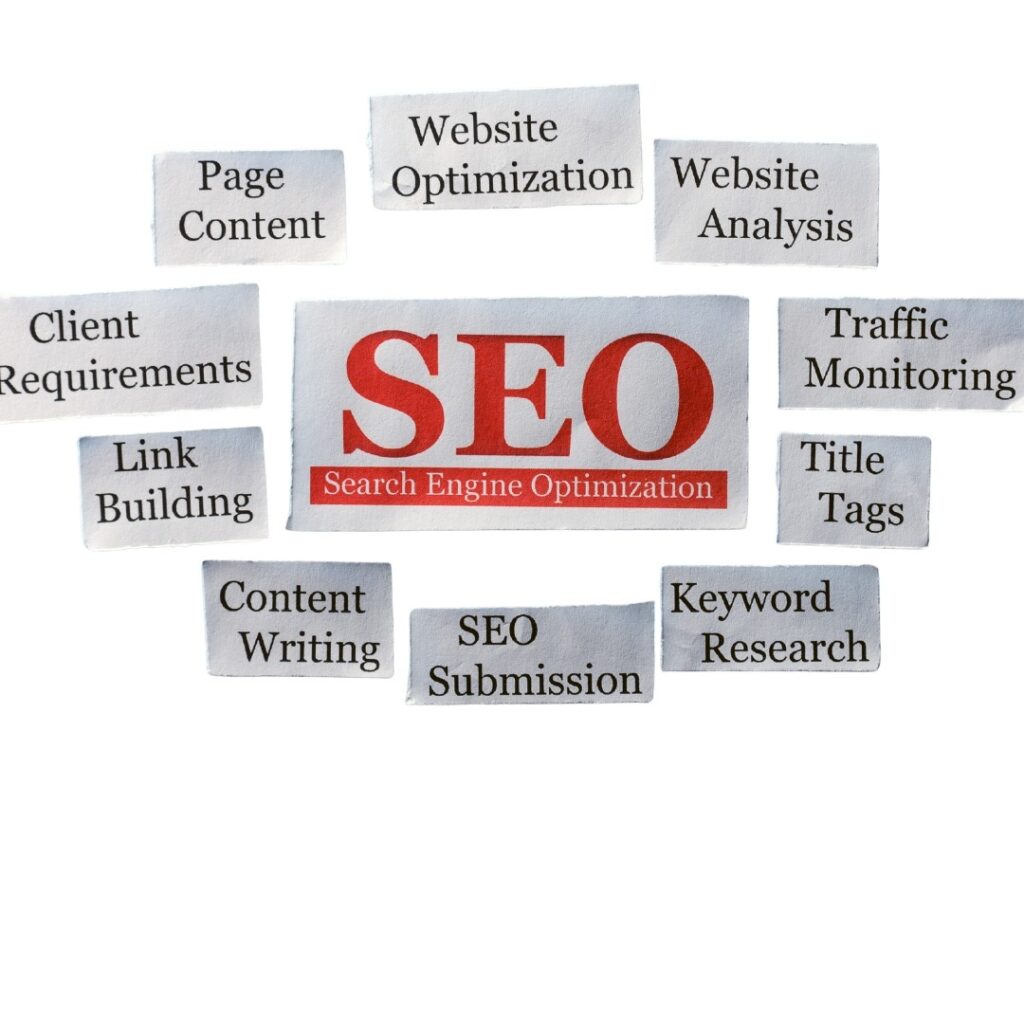Search Engine Optimization, or SEO for short, is all about enhancing your website so it ranks higher in search engine results when people look for topics related to your business. Imagine giving your website a makeover to catch the eye of search engines like Google, Bing, and Yahoo. The goal is simple help people find your content easily when they are searching online.

SEO is not just about adding keywords to your content. It involves many techniques like creating high-quality content, optimizing meta tags, improving website speed, and building trustworthy backlinks. These steps are designed to help search engines grasp what your site is all about and how beneficial it is for users. When done right, Search Engine Optimization boosts your chances of ranking higher without paying for ads.
A major benefit of SEO is that it can significantly boost the organic traffic to your website. This means people visit your site naturally, not because you paid to show up in front of them. And here is the best part organic visitors are often more likely to stay longer and take action, whether that is reading your blog, signing up for a newsletter, or making a purchase.
Search Engine Optimization also builds trust. When your website ranks on the first page of Google, users tend to see it as more reliable. Think about it how often do you scroll past page one when searching for something? A strong SEO strategy helps you get seen where it matters most and keeps your brand visible over time.
To sum it up, SEO is more than a technical trick it’s a smart, ongoing process that helps your website connect with the right people at the right time. Whether you are a blogger, small business owner, or running a large ecommerce site, mastering SEO techniques can help you grow online in a natural and lasting way.
Why Search Engine Optimization is Important

In today’s digital-first world, having a website isn’t enough. If your potential customers can’t find you online, you’re practically invisible. That’s where Search Engine Optimization (SEO) steps in it helps your business show up when people search for products or services like yours. Whether you’re a local store or a global brand, SEO makes sure your digital presence doesn’t get buried beneath your competitors.
Good SEO doesn’t just bring any traffic it brings the right kind of traffic. When someone types a query into Google, they’re looking for answers, and ranking higher in search results makes you more likely to be that answer. Through proper use of keywords, user friendly content, fast-loading pages, and strong backlinks, Search Engine Optimization connects your website with people who are actively interested in what you offer.
Not only does SEO help you get found, but it also builds trust. Websites that rank on the first page of search engines are often seen as more credible. Unlike paid ads that vanish once your budget is spent, SEO provides lasting results that keep on giving. It boosts your organic traffic, increases brand awareness, and helps you compete even with bigger players in your industry.
Here’s a real eye-opener more than 68% of online experiences begin with a search engine, and about 75% of users don’t scroll past the first page of search results. That means if you’re not ranking well, you’re missing out on a huge chunk of potential traffic. With smart Search Engine Optimization in place, your business can be in front of the right people at the right time without spending big on ads.
Benefits of Search Engine Optimization

Search Engine Optimization is more than just a hot term it’s one of the most powerful tools a business can use to grow online. Whether you are a small local brand or a growing startup, SEO helps your website get found by the people who are actually looking for what you offer. When you show up in search results, it is not just about being seen; It is about being trusted.
One of the biggest benefits of SEO is organic traffic. This means people visit your site without you having to pay for ads every time. When your website ranks higher on Google or other search engines, more people will naturally click and explore your content or services. Since they are already on the lookout for what you offer, they are much more inclined to turn into customers.
Some key benefits of Search Engine Optimization (SEO):
Boosts website visibility and brand recognition.
Helps attract high-intent visitors who are already looking for your service.
Improves user experience through faster loading and better content structure.
Builds credibility and trust over time.
Delivers long-term results even after you stop actively working on it.
Another important advantage is that SEO is a long-term investment. Unlike paid advertising, where visibility ends as soon as you stop spending, a well-optimized site keeps performing for months or even years. It works in the background 24/7, helping your brand grow without constant effort or cost.
Most importantly, SEO helps build trust and authority. Users are more likely to click websites that appear on the first page of search results, and this trust leads to more engagement, more conversions, and stronger customer relationships. With the right Search Engine Optimization strategy, you do not just show up you stand out.
Types of Search Engine Optimization and specialization

On-page SEO focuses on optimizing individual web pages. This includes using the right keywords, writing engaging content, optimizing headings, images, and internal links—making your page useful and search engine friendly.
Specialization:
Content writers, SEO strategists, and webmasters often specialize in on-page SEO by mastering keyword research, HTML tag structure, and readability to improve organic rankings.
- Off-Page SEO
This type is all about what happens outside your website like building backlinks, social sharing, and digital PR. It improves your website’s credibility and standing with search engines.
Off-page SEO experts specialize in link building strategies, outreach, content promotion, and managing brand reputation online. - Technical SEO is all about ensuring that your website operates flawlessly behind the scenes. It includes improving page speed, fixing crawl errors, creating sitemaps, mobile-friendliness, and making sure search engines can index your site properly.
Technical SEO professionals are often developers or SEO tech specialists who work closely with site architecture, performance tools, and Google Search Console.
- Local SEO helps your business appear in searches near your geographic location. It is vital for service-based or storefront businesses trying to attract nearby customers through Google Maps and local listings.
Specialization:
Local SEO specialists focus on optimizing Google Business Profiles, collecting local reviews, local citations, and making sure the business ranks for “near me” and city-specific searches.
How Search Engine Optimization works?
Search Engine Optimization works by making your website easier for search engines to understand. It involves content, structure, keywords, and trust signals to help you rank higher and attract organic traffic.

1. Keyword Research:
It all begins with keyword research discovering what your audience is really looking for. This helps you target the right topics and match your content with real user intent on search engines.
Choosing the right keywords is like knowing what your customers are thinking. SEO tools help identify phrases people use, so you can create content that directly answers their questions or needs.
2. Quality Content Creation:
High-quality, useful content is the heart of SEO. Search engines reward websites that give people real value whether through blogs, guides, or product pages with clear, engaging information.
When your content truly helps someone answers a question, solves a problem, or explains a topic Google notices. Consistent, honest content builds trust and keeps people coming back to your site.
3. On-Page SEO:
On-page SEO makes your website content-friendly for both users and search engines. This includes optimizing headlines, meta tags, images, and internal links to improve your site’s visibility and relevance.
Think of on-page SEO as giving your shop window a good polish. Clear titles, organized structure, and helpful links make it easier for both visitors and search engines to understand your message.
4.Technical Setup:
Search Engine Optimization also involves the technical side like site speed, mobile-friendliness, secure connections, and crawling accessibility. These factors help search engines easily read and rank your website correctly.
If your website is slow or confusing for search engines to crawl, you will not rank well. Clean code, mobile design, and fast loading give your site a solid foundation.
5. Backlink Building:
Getting quality backlinks from other trusted websites tells search engines your content is credible. The more trustworthy links you earn, the more search engines trust and rank your website.
Backlinks are like online votes of confidence. When other reputable sites link to you, Google sees your content as more trustworthy and important which helps you climb higher in search results.
6. Crawling:
Crawling is the first step in SEO where search engines send bots to discover your website pages. If your website is not crawlable, search engines will not even know it is there.
7. Indexing:
After crawling, search engines index your pages by storing the content in their database. Only indexed pages can appear in search results when someone types in a related query.
8. Rendering:
Rendering refers to how search engines analyze your site’s code to figure out how it looks and operates. It helps determine if your content is user-friendly, mobile-ready, and worth ranking.
9. Ranking:
Ranking decides where your page appears in search results. Search engines use hundreds of factors like relevance, speed, backlinks, and content quality to choose the best match for a search query.
How to Create a Search Engine Optimization Strategy for Your Business

Creating a strong Search Engine Optimization strategy starts with understanding your business goals. Ask yourself—do you want more traffic, better leads, or more visibility for specific products or services? A clear goal sets the foundation for your entire SEO plan and helps you stay focused on results that actually matter.
Once your goal is set, the next step is keyword research. You need to find the exact words and phrases your target audience is typing into search engines. Tools like Google Keyword Planner or Uber suggest can help uncover search volume and competition. From there, create content that answers real questions your customers are asking—that’s the heart of organic growth.
After choosing the right keywords, it is time to build a solid content strategy. This means creating useful, engaging, and original content that speaks directly to your audience’s needs. Make sure to optimize every page by incorporating relevant keywords, meta tags, internal links, and compelling headings. A good content plan also includes updating existing pages to keep them fresh and competitive.
Finally, don’t forget to measure and adjust. Track your search rankings, website traffic, and user behavior through tools like Google Analytics and Search Console. SEO is far from a one-time effort; It is an ongoing adventure. With the right Search Engine Optimization strategy in place, your business can build long-term trust, rank higher, and stay ahead of competitors online.
How Search Engine Optimization evloves
Search Engine Optimization has really evolved since its beginnings. Back then, getting a good ranking on Google was all about cramming your pages with keywords and purchasing backlinks. It was more about tricking the system than helping the user. But over time, Search Engine Optimization has grown into a much smarter, user-focused process.
As Google’s algorithms evolved, so did SEO strategies. Updates like Panda, Penguin, and Hummingbird forced websites to focus on quality content, trustworthiness, and relevance rather than shortcuts. Today, if your content does not provide real value, it simply will not rank—no matter how many keywords you cram in.
The rise of smartphones also reshaped SEO. Mobile-first indexing, responsive design, and page speed have all become key players in determining search rankings. People now search on the go, so Search Engine Optimization had to prioritize mobile-friendly experiences to keep up with shifting behavior.
More recently, voice search and AI tools have changed the game. SEO is now about understanding natural language, user intent, and even predicting what people might need next. As search becomes more conversational, businesses must focus on clarity, context, and delivering real answers not just rankings.
Search Engine Optimization as a service

Search Engine Optimization as a service means hiring professionals or an SEO agency to improve your website’s visibility on search engines like Google. Instead of doing everything yourself, you let experienced experts handle the technical, creative, and strategic work needed to grow your traffic organically.
Today, many businesses especially small and mid-sized turn to SEO service providers to boost their digital presence without burning time or energy. Whether you are just starting or already online, having an SEO team in your corner can make a huge difference in reaching your audience.
Here is what is typically included in Search Engine Optimization services:
- Keyword research based on real search trends
- On-page optimization (titles, content, meta tags, URLs)
- Technical fixes (site speed, mobile friendliness, crawl errors)
- Content creation and blog strategy
- Backlink building and outreach
- Monthly performance tracking and reporting
One of the biggest benefits of using SEO as a service is scalability. As your business continues to grow, your SEO strategy needs to evolve alongside it. Professionals can adjust the plan based on your niche, competitors, and evolving goals.
At its core, Search Engine Optimization as a service is not just about rankings it’s about getting found by real people, building trust, and turning clicks into customers. It is a long-term investment that continues to deliver value month after month.
FAQs About Search Engine Optimization
What is Search Engine Optimization (SEO)?
SEO focuses on refining your website to increase its visibility in search engine results. By doing this, you can draw in organic (non-paid) traffic, making your site more relevant and trustworthy for both users and search engines.
- Why is SEO important for my business?
SEO drives targeted traffic, builds trust, increases brand awareness, and improves your site’s chances of ranking high on Google — all without paying for ads. It is essential for long-term online growth. - How does SEO work?
SEO works by optimizing different elements of your website — including keywords, content, page speed, mobile-friendliness, and backlinks — to align with search engine algorithms and user intent. - How much time does SEO actually take to start showing real results?
Generally, it takes 3 to 6 months to see noticeable improvements. SEO is like planting a seed for the future; it takes time to grow and really starts to succeed as you support it. - Is SEO a one-time task or an ongoing process?
SEO is an ongoing process. Search engines update their algorithms regularly, and competitors keep optimizing too. To maintain rankings and performance, your site needs regular updates and content optimization.
